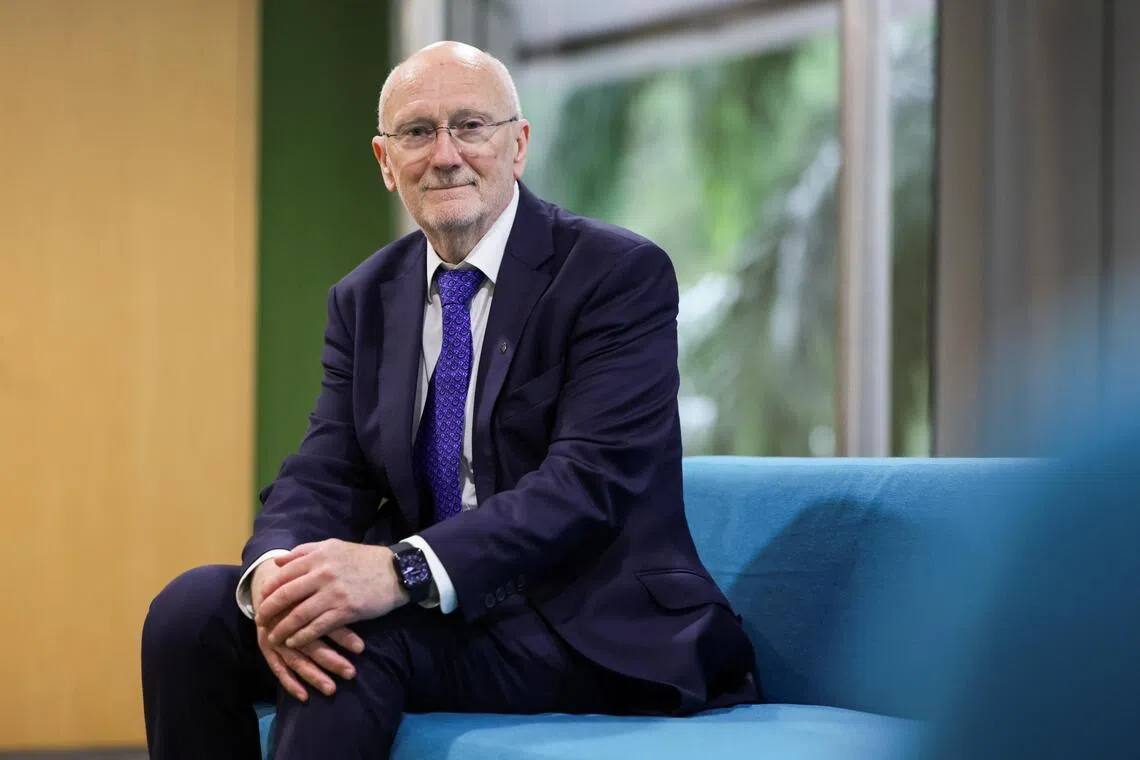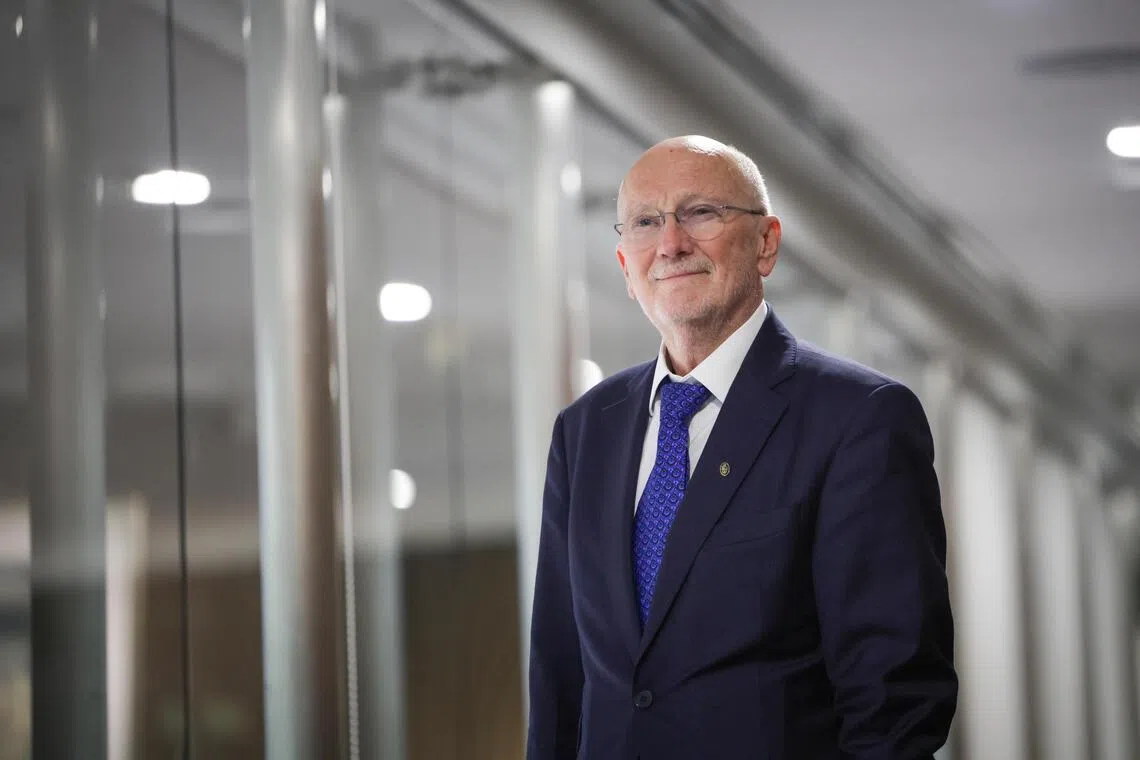Offshore nuclear plant in S’pore can increase distance from communities, but poses drawbacks: Expert
Sign up now: Get ST's newsletters delivered to your inbox

Professor Laurence Williams has 50 years of international nuclear experience under his belt.
ST PHOTO: GIN TAY
- Professor Williams advises NEA on nuclear safety, security, and emergency preparedness until 2027.
- Singapore is seriously studying nuclear energy, including advanced technologies like small modular reactors, but needs a detailed roadmap.
- Public confidence is vital—Singapore needs to be open about technology, safety, and regulation, and acts as an "intelligent observer" of neighbours.
AI generated
SINGAPORE - Building a nuclear plant offshore could provide more distance between the reactors and the general population, but would also come with challenges, like isolating its workforce, said the chairman of the National Environment Agency’s (NEA) Nuclear Safety Advisory Panel.
Professor Laurence Williams, who hails from Britain, said other factors to consider included the need to build subsea cables to transfer electricity from the plant to the mainland, security issues and extreme weather conditions.
Prof Williams, who has 50 years of international nuclear experience under his belt, was speaking to the media on Nov 14. He is due to receive the Public Service Medal at the 2025 National Awards Investiture on Nov 16. He is among 186 recipients who have been awarded the medal.
After being a member of the advisory panel since 2016, Prof Williams was appointed chairman in 2025. In this role, which he will hold until 2027, he will advise NEA on nuclear safety, security, safeguards and emergency preparedness in the light of regional developments as Singapore ramps up its capability-building efforts.
Beyond NEA, other government organisations that have an interest in nuclear energy can also come to the panel and ask for advice on regulation, approaches to regulation, technologies, radiation protection and emergency preparedness, he said.
“It’s very much an independent advisory role to help Singapore understand the nuclear technology and some of the issues from surrounding countries, and also help them prepare that,” said Prof Williams, who added that it was a “great honour” to be chairman.
He was previously Her Majesty’s Chief Inspector of Nuclear Installations, as well as chairman of the Defence Nuclear Safety Committee in Britain.
On the global stage, he was chairman of the Commission on Safety Standards at the International Atomic Energy Agency (IAEA), the UN nuclear watchdog, from 2000 to 2005.
He currently sits on the High Scientific Council of the European Nuclear Society.
Singapore is mulling over the use of nuclear energy to safeguard energy security and affordability in a climate-friendly way.
Discussions on this issue so far have touched on possible locations for such a plant – including in offshore areas – if Singapore decides to deploy nuclear energy.
Prof Williams said positioning a nuclear plant nearer to where communities are could also have benefits.
“If the power plant is near your community, then you’re more likely to be interested in making sure that it’s being operated properly and safely,” he said.
“There will be proper analysis done of all siting locations, and those decisions will be made for a variety of reasons, (such as) safety, security and operation,” he added.
While Singapore has yet to make a decision on deploying nuclear energy, the country is “seriously studying” it and is looking closely at advanced nuclear technologies like small modular reactors.
Asked about the steps that Singapore needs to take if it is considering deploying nuclear energy, Prof Williams said launching a nuclear energy programme requires a detailed road map.
Among other things, Singapore has to have access to technical capabilities, build a skilled workforce that understands the challenges, develop public awareness and confidence, set timelines and establish a robust legal and regulatory framework, he said.
A strong legal framework to regulate nuclear energy deployment is key because of its high energy density and hazard potential, he said.
“We need to have a special legal framework that puts responsibilities on operators, and also gives powers and responsibilities to the regulator who is acting on behalf of the government and the public to make sure the operator does the right things,” he added.
The Straits Times reported on Oct 20 that the Singapore Government has reorganised itself
The remits of both teams are different. EMA assesses the feasibility of deploying advanced nuclear energy technologies for power generation in Singapore, while NEA will deepen expertise in nuclear safety, security and safeguards as the radiation and nuclear safety regulator.
When coming up with its own legal framework, Prof Williams said that Singapore can draw guidance and best practices from the IAEA, as well as countries like Britain, the US and France. These countries have established nuclear programmes and frameworks.
“Ultimately, the fundamental principles of regulation would be the same as in other countries, but the actual way in which Singapore does it would be very specific to its law,” he said.
Another factor to successfully deploy nuclear energy is public confidence.
Describing the process of gaining public acceptance as earning a “social licence”, Prof Williams said this entails being as open as possible about the technology, safety measures, operation and regulatory oversight.
“It doesn’t matter how good your reactor design is and how well you can operate it – if your local public doesn’t want it for whatever reason, then it’s not going to happen,” he said. “A social licence is recognising that you need to bring the public along with you.”
It is also important to educate members of the public about radiation while addressing fears rooted in nuclear accidents, he said.
In some countries, public concern over nuclear facilities has influenced decisions to shut down or restart plants. For example, in Italy and Germany, concern over potential health and environmental implications of nuclear power resulted in the decommissioning of operational nuclear facilities, even in the absence of direct accidents.
Prof Williams added that Singapore should determine its own tolerable level of risk before making informed decisions on the criteria to be set and choice of reactor technology.
Citing his experience in Britain, Prof Williams noted how public perception can be improved with three measures.
The first is having a technically competent nuclear operator with a licence.
The second is having an independent assurer within the organisation to oversee safety.
“Within the organisation, there needs to be some part of it that is independent of the generation of energy and electricity,” he said, adding that this team will provide assurance about how the reactors are operating, and how design assessments are done.
“So at the board of the company, you have the chief nuclear officer responsible for producing as much power as he could, but you also have the director of safety and assurance there giving the view of safety.”
Lastly, having an external independent statutory regulator who acts on behalf of the public is critical.
Even if Singapore decides against using nuclear in the future, the country should be an “intelligent observer” to keep tabs on the development of nuclear energy, said Prof Williams.

Prof Williams added that Singapore should determine its own tolerable level of risk before making informed decisions on the criteria to be set and choice of reactor technology.
ST PHOTO: GIN TAY
Five Asean countries – Vietnam, Indonesia, the Philippines, Malaysia and Thailand – have said they are either studying the feasibility of advanced nuclear technology to meet their growing energy needs, or already have plans to build reactors in the coming decades.
“One of the key things is for Singapore to develop that nuclear competence to the level where you can understand what your neighbours are doing, in terms of what technology they’re buying, how they’re organising themselves to construct and operate,” he said.
It is ultimately up to the Republic to decide whether to deploy nuclear energy, and what kind of technology to tap if it decides to do so, he said.
“I wouldn’t dare tell Singapore what type of reactor to operate, but I’m quite prepared to give advice on whatever it chooses... and the safety issues (it) should be looking out for,” he said.



